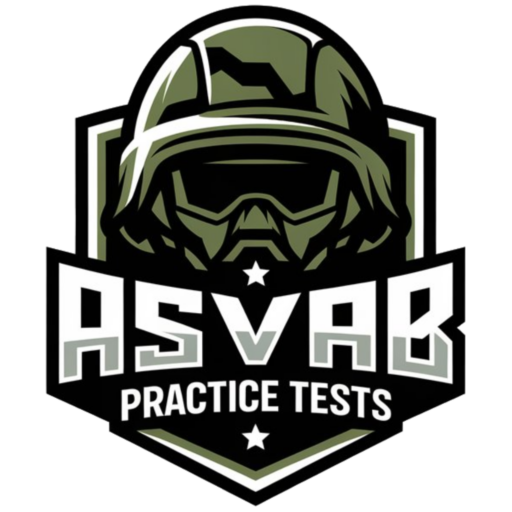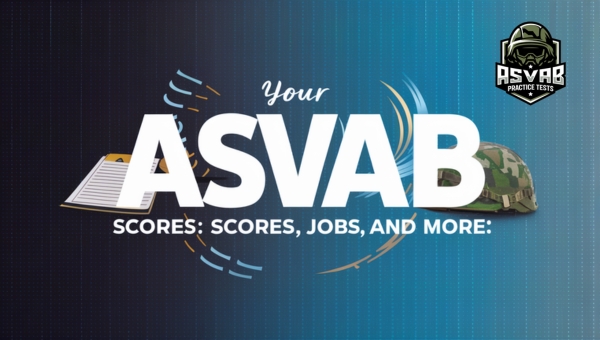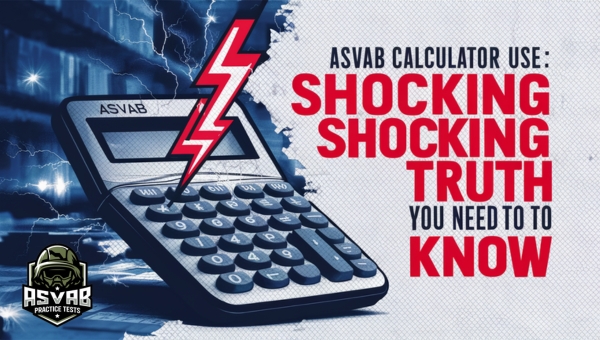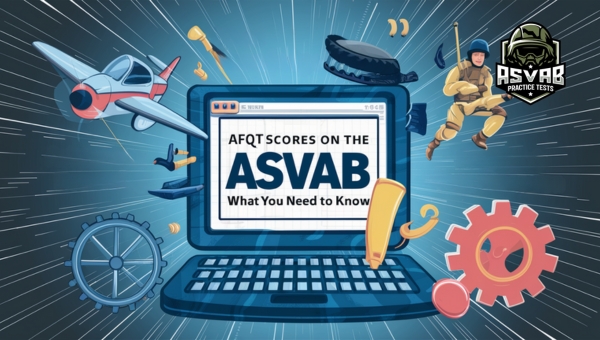National Guard ASVAB Practice Tests – Ace Your Exam Now!
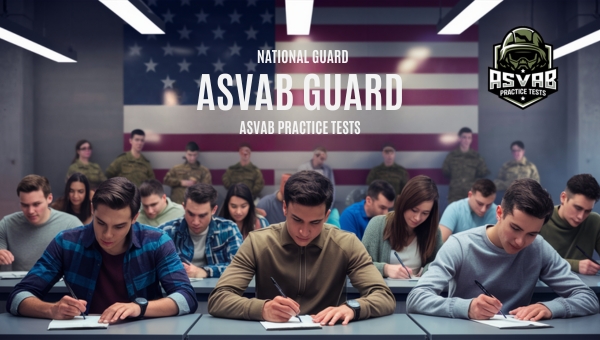
Are you looking to join the National Guard? The National Guard ASVAB is a crucial step in achieving that goal. In this article, you’ll learn why the ASVAB is essential, how practice tests can enhance your performance, and what types of practice tests are available.
We’ll also delve into effective strategies for maximizing your results. By the end, you’ll be well-prepared and confident to ace your National Guard ASVAB. Let’s dive in and get you one step closer to your dream career!
Breaking Down the National Guard ASVAB
The Armed Services Vocational Aptitude Battery (ASVAB) is a crucial test for anyone looking to join the military, including the National Guard. This standardized test assesses a candidate’s abilities and potential to succeed in various military roles.
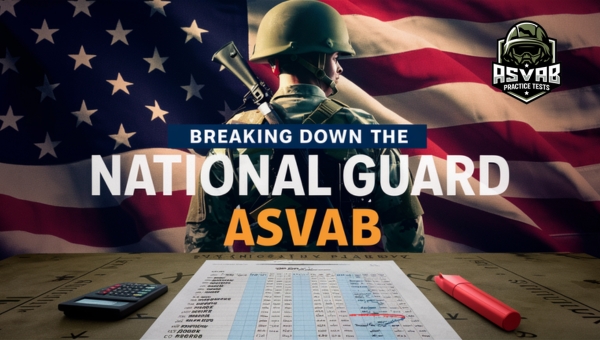
Although it might seem daunting at first, understanding its structure and importance can ease the preparation process. In the following sections, we will delve into how the ASVAB impacts eligibility and career placement, as well as how scores are calculated and used.
Importance of the ASVAB for National Guard Recruits
The ASVAB is vital for National Guard recruits due to several reasons:
- Eligibility Determination: It helps determine if a recruit meets the minimum qualifications for enlistment.
- Career Placement: Higher scores can open doors to more specialized and advanced roles within the National Guard.
- Skill Assessment: It provides a comprehensive evaluation of a recruit’s strengths and weaknesses in various skill areas.
- Training Suitability: The results indicate how well a recruit might perform in military training programs.
ASVAB Scoring for National Guard Careers
Understanding how ASVAB scores are calculated and used is essential for aspiring National Guard members:
- Scoring System: The ASVAB consists of multiple subtests. Scores from these subtests are combined to create a composite score known as the Armed Forces Qualification Test (AFQT).
- Career Opportunities: Each military occupation has specific score requirements. Thus, your ASVAB scores will directly influence the roles you qualify for in the National Guard.
- Subtest Focus: Key subtests include Arithmetic Reasoning, Word Knowledge, and Mechanical Comprehension, among others. Excelling in specific subtests can better align you with preferred career paths.
- Score Interpretation: Understanding your scores can help you identify areas for improvement and better prepare for the roles you aim to pursue.
The ASVAB is more than just a test; it is a gateway to a fulfilling career in the National Guard, making it crucial to prepare thoroughly and understand the scoring implications.
Why Take National Guard ASVAB Practice Tests?
Taking National Guard ASVAB practice tests can be a game-changer for recruits. These practice tests are excellent tools for improving overall test performance, identifying personal strengths and weaknesses, and reducing test anxiety. Let’s dive into why these practice tests are essential for your success.
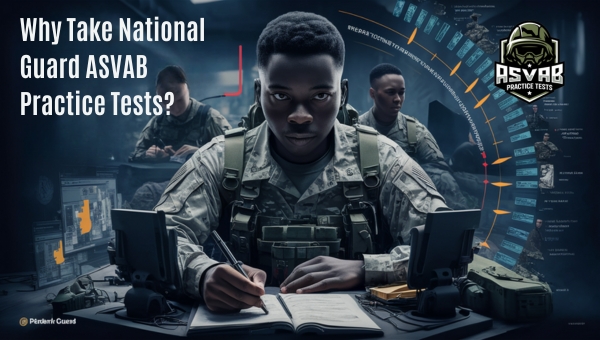
Enhancing Test Performance
Regular practice with National Guard ASVAB tests significantly boosts overall test performance. By repeatedly engaging with practice questions, recruits become familiar with the format and types of questions they will encounter on the actual test.
This familiarity helps them develop effective test-taking strategies, such as time management and question prioritization.
- Familiarity with Test Format: Regular practice helps recruits understand the structure of the ASVAB, including the types of questions and the time limits for each section.
- Improved Time Management: Practicing under timed conditions helps recruits pace themselves, ensuring they can complete each section within the allotted time.
- Development of Test-Taking Strategies: Through repeated practice, recruits can refine their approach to answering questions, such as identifying keywords and eliminating incorrect answer choices.
- Increased Confidence: As recruits see their practice scores improve over time, their confidence in their ability to perform well on the actual test grows.
Identifying Strengths and Weaknesses
Practice tests are invaluable for helping recruits identify their strengths and weaknesses. By analyzing their performance on practice tests, recruits can pinpoint which areas they excel in and which areas need more attention.
This targeted approach to studying ensures that recruits are making the most of their preparation time.
- Self-Assessment: Practice tests provide recruits with a clear picture of their current skill level in each test section.
- Targeted Study: By identifying weak areas, recruits can focus their study efforts on improving these specific skills, rather than spending equal time on all sections.
- Tracking Progress: Regular practice tests allow recruits to track their improvement over time, providing motivation and a sense of accomplishment as they see their scores rise.
- Efficient Use of Time: By focusing on areas that need the most improvement, recruits can make the most efficient use of their study time.
Reducing Test Anxiety
One of the most significant benefits of taking National Guard ASVAB practice tests is the reduction of test anxiety.
Test anxiety can negatively impact performance, but familiarity with the test format and content can help alleviate this stress.
- Simulated Test Environment: Practice tests mimic the conditions of the actual ASVAB, helping recruits become accustomed to the testing environment and reducing the fear of the unknown.
- Increased Comfort Level: The more familiar recruits are with the test format and types of questions, the more comfortable they will feel on test day.
- Stress Reduction Techniques: Regular practice allows recruits to develop and implement stress reduction techniques, such as deep breathing and positive visualization.
- Boosted Confidence: As recruits see their practice scores improve, their confidence in their ability to perform well under pressure increases, further reducing anxiety.
By focusing on enhancing test performance, identifying strengths and weaknesses, and reducing test anxiety, National Guard ASVAB practice tests provide recruits with a comprehensive and effective preparation strategy.
Types of National Guard ASVAB Practice Tests
When preparing for the National Guard ASVAB, various types of practice tests can significantly enhance your readiness. Understanding the differences between these practice tests can help you choose the best approach for your study needs.
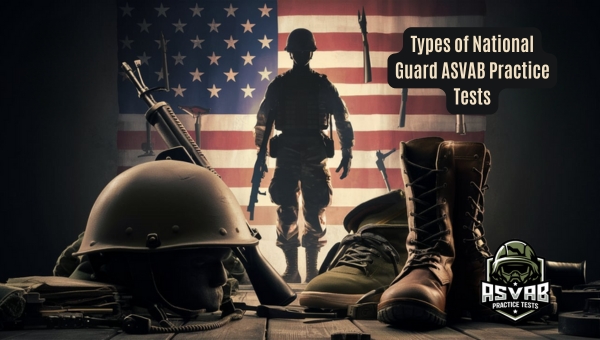
Full-Length ASVAB Practice Tests
Full-length ASVAB practice tests are designed to simulate the actual ASVAB experience. These tests cover all sections and mimic the format and time constraints of the real exam.
Here are the benefits:
- Comprehensive Coverage: Full-length tests include all sections of the ASVAB, providing a complete overview of what to expect. This helps you become familiar with the entire test structure.
- Timed Practice: By adhering to the same time limits as the real ASVAB, these tests help you practice managing your time efficiently across different sections.
- Performance Assessment: Taking a full-length practice test allows you to assess your overall readiness and identify how well you perform under test conditions.
- Test-Taking Stamina: Completing a full-length test can build the mental and physical stamina required to stay focused throughout the actual exam.
Section-Specific Practice Tests
Section-specific practice tests focus on individual parts of the ASVAB, such as Arithmetic Reasoning or Word Knowledge. These tests are particularly useful for targeted studies.
Here’s what you need to know:
- Focused Improvement: These tests allow you to concentrate on specific areas where you need improvement, making your study sessions more efficient.
- Deep Understanding: By repeatedly practicing one section, you can gain a deeper understanding of the types of questions and content that will appear.
- Incremental Progress: Regular practice in specific sections helps you track incremental progress, giving you a clear picture of your strengths and weaknesses.
- Time Management: Practicing individual sections helps you develop better time management strategies tailored to each part of the ASVAB.
Online vs. Offline Practice Tests
Choosing between online and offline practice tests can impact your study experience. Each format has its unique advantages:
- Online Practice Tests:
- Immediate Feedback: Online tests often provide instant scoring and detailed explanations, helping you quickly understand your mistakes.
- Accessibility: You can take online tests from anywhere with an internet connection, offering flexibility and convenience.
- Interactive Features: Some online platforms offer interactive features such as progress tracking and personalized study plans.
- Offline Practice Tests:
- Traditional Experience: Paper-based tests offer a more traditional test-taking experience, which can be beneficial if you prefer working with physical materials.
- Reduced Distractions: Offline tests eliminate digital distractions, allowing for a more focused study session.
- Simulated Test Conditions: Taking offline tests can better simulate the actual ASVAB environment, especially if the real test is also paper-based.
Choosing the right type of practice test depends on your personal preferences and study goals. By incorporating a mix of full-length, section-specific, and various formats, you can create a well-rounded preparation strategy that enhances your readiness for the National Guard ASVAB.
How to Maximize Your Results with National Guard ASVAB Practice Tests?
Preparing for the National Guard ASVAB requires more than just hitting the books. Effective preparation involves strategic planning, thorough review, and creating a realistic test environment. Let’s dive into some crucial steps to help you maximize your results.
Setting Up a Study Plan
Creating a structured study plan is essential for effective ASVAB preparation. Here are some detailed tips to get you started:
- Assess Your Current Knowledge:
- Begin by taking an initial practice test to identify your strengths and weaknesses.
- Use these results to tailor your study plan, focusing more time on areas where you need improvement.
- Create a Study Schedule:
- Allocate specific times each day or week dedicated to studying different sections of the ASVAB.
- Ensure your schedule is realistic and consistent to maintain steady progress.
- Incorporate Regular Practice Tests:
- Schedule full-length practice tests periodically to gauge your overall readiness.
- Use section-specific tests to focus on and improve particular skills.
- Set Achievable Goals:
- Establish short-term and long-term goals to keep you motivated.
- Track your progress and adjust your study plan as needed.
Reviewing Your Results
Reviewing your practice test results is a critical step in the preparation process. Here’s how to do it effectively:
- Analyze Incorrect Answers:
- Take time to understand why each incorrect answer was wrong.
- Determine if the mistake was due to a lack of knowledge, a misunderstanding of the question, or a simple error.
- Learn from Mistakes:
- Identify patterns in your mistakes to uncover areas needing more attention.
- Focus on learning the correct concepts and strategies to avoid repeating the same errors.
- Review Correct Answers:
- Even when you answer correctly, ensure you understand why the answer is right.
- This reinforces your knowledge and helps you recognize similar questions in the future.
- Adjust Your Study Plan:
- Use the insights from your review to update your study schedule.
- Spend additional time on weaker areas while maintaining strengths.
Simulating Real Test Conditions
Practicing under conditions that mimic the actual ASVAB is crucial for building confidence and improving performance.
Here’s how to do it:
- Set a Timer:
- Use a timer to simulate the time constraints of the actual ASVAB.
- Practice managing your time effectively to ensure you can complete all sections within the allotted time.
- Create a Quiet Environment:
- Find a quiet, distraction-free space to take your practice tests.
- This helps replicate the testing environment and improves focus.
- Follow Test Rules:
- Stick to the rules and guidelines of the actual ASVAB during your practice sessions.
- Avoid using any study aids or resources to get an accurate measure of your readiness.
- Review and Reflect:
- After each timed practice test, review your performance.
- Reflect on how well you managed your time and identify any areas for improvement.
By following these steps, you can create an effective study plan, thoroughly review your practice test results, and simulate real test conditions to maximize your results on the National Guard ASVAB.
Conclusion
Preparing for the National Guard ASVAB with practice tests is an essential step for any recruit. These tests not only enhance your test performance but also help identify your strengths and weaknesses while reducing test anxiety.
By utilizing different types of practice tests and following a structured study plan, you can significantly improve your chances of achieving a high score and securing your desired career within the National Guard.
